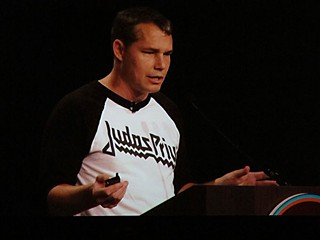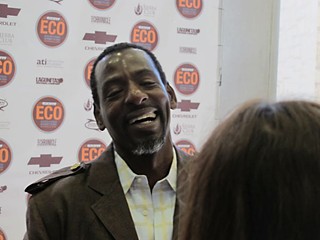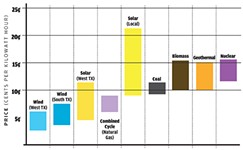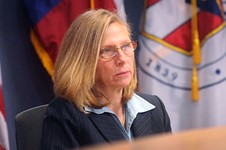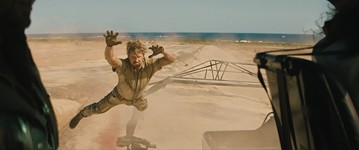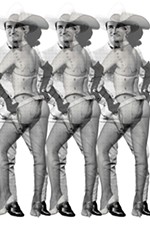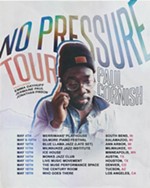SXSW Eco: Remember the Dinosaurs
Green conference bridges gap between environmental movement and tech scene
By Richard Whittaker, Fri., Oct. 11, 2013
How can anyone afford to become an environmentalist? That's been the underlying subtext of this year's SXSW Eco – with the question of the reality of global climate change settled, the problem now is how to deal with it. In her opening remarks, UN Framework Convention on Climate Change Executive Secretary Christiana Figueres said she hopes we're nearing "the tipping point, where low carbon is the new norm." However, there remains a disparity between best intentions and actual investment.
Part of SXSW Eco's mission is bridging the gap between the traditional environmental movement and the tech scene. Yet, as the trade show floor and the multitude of corporate representatives in panels showed, that's not where the chasm lies. It's between the innovating clean tech companies and potential investors. The situation is not so bad for start-ups developing, for example, software solutions to green problems. It's the capital-intensive firms – the ones manufacturing new widgets or new technologies – that are finding the going tough. Rick Yang, principal at venture capital behemoth NEA, said "They're not bad businesses. They just don't quite fit into the venture capital sweet spot."
The mechanical act of creation is inherently polluting, and that's a tricky path for any environmentally minded entrepreneur. Artist and keynote speaker Shepard Fairey – creator of the iconic Obama "Hope" graphic – explained to a packed ballroom that he had no inherent issue with capitalism, but he's enraged by how lopsided it has become at the expense of the environment. But then again, he made his money and his reputation from printing posters on paper that comes from trees. While he pointed out that his card stock is 80% recycled materials, "I'm not 100 percent hypocrisy free."
Even the traditionally bleeding-heart eco-liberal media has a challenge of the bank balance. M. Sanjayan, chief scientist for the Nature Conservancy, attended the conference to screen scenes from Years of Living Dangerously, the new eight-part environmental documentary series from Showtime featuring such diverse Hollywood luminaries as Arnold Schwarzenegger, Harrison Ford, and Matt Damon. Sanjayan explained that he isn't going to get rich doing this, so he needs the series to do two things. Firstly, it has to be scientifically accurate; secondly, it has to attract viewers: in part because there's a pressing need to get this information to as many people as possible, but – and this will always be the big concern for Showtime – also because that's the inevitable demand of television. Viewers equal revenue.
Farshid Arman, director of energy technologies at Siemens TTB, noted an additional wrinkle for the truly innovative. "Finance people don't take risks. They don't care how good your idea is. Has it worked before? No? Then get out." But he was also leery of having government step into the funding breach. When it comes to developing the next cutting-edge slice of technology, it shouldn't be because "some dude in the Department of Energy has sat down and picked a winner."
Activist Ron Finley echoed that the current system has to change, but he did not see the solution coming from financiers making the right investments. Instead, he argued that people are going to have to do it for themselves. Sometimes dubbed the "Gangster Gardener," the native of South Central L.A. referred to himself as an "urban anthropologist. My lab is the street, and what I was finding was pissing me off." His great fear is that people have become too disconnected from basic truths – in particular, where food comes from. He called modern poor neighborhoods "food prisons. You literally have to break out of these places to find healthy food anywhere." In his view, the prison warder is the fast-food industry, which has helped make an epidemic of Type II diabetes. "They're basically terrorizing communities and the United States. To me, it's legal genocide." For Finley, food is the starting point of a cultural revolution. He was highly dismissive of the idea that the current social inequality in America will be solved by giving every kid an iPad. He said, "Let's just try an experiment. Let's feed these kids healthy food and see what happens to them."
His solution has been painted as radical, even though it's the oldest one in the book: Get people growing their own food. He started using city-owned parkways and medians to grow vegetables. It has been an uphill struggle. While urban gardens used to be commonplace, many people no longer have the basic skills to tend a garden – or, as Finley succinctly put it, "your ass can't use a shovel, but you can tweet." The city tried to close down his garden, issuing a citation because "somebody might trip over an eggplant." Nevertheless, Finley's ideas have fallen on fertile ground, and this super-locavore movement is gaining traction. Moreover, Los Angeles has not only backed down on its case against him, but has stopped issuing such citations. Finley said, "It shows that one person with 200 million people behind them can make a change."
There are many such signs that local governments are changing the game when it comes to environmentalism, and there is a glimmer of hope that global financial institutions are turning the corner too. As Robin Chase, founder of car-sharing site Zipcar, noted in her keynote speech, the World Bank has issued a report called "Turn Down the Heat: Why a 4°C Warmer World Must Be Avoided." Its findings are the only chilling part of the equation. If all current global climate control commitments are met, there is a 20% chance that the average global temperature will still rise by 4°C (7°F) by 2100. Without keeping those promises, that deadly target would be reached in the 2060s. For comparison, Chase said, when Austin was 7°F cooler than it is now, it was under 100 feet of ice during the last Ice Age. Chase concluded: "It's unclear that humans can exist at plus-seven degrees."
Finley was even more succinct. "Mother Nature don't play. Just ask the dinosaurs."
Got something to say on the subject? Send a letter to the editor.





